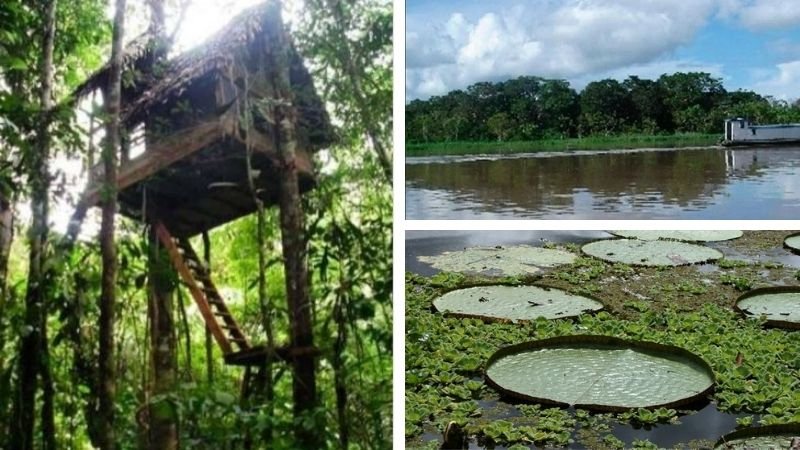
The Aguas Claras Natural Reserve is located about 20 km from Leticia, capital of the Amazonas department of Colombia, on the road that leads to Tarapacá.
In rainy seasons you can also access this nature reserve by river. It has an area of 15.1 hectares and is 150 m.a.s.l.
Ecotourism in the Aguas Claras Natural Reserve
It represents a natural space that allows ecotourism and the conservation of the environment and its biodiversity of flora and fauna (Uff Travel, 2020).
Accommodation for visitors in the Aguas Claras Nature Reserve is generally in cabins and malocas.
The latter are communal dwellings built in the Amazon since ancient times, mainly by the indigenous people of the Huitoto ethnic group, with wooden pillars and a roof made of interwoven leaves.
They house a large number of people as communal housing; they are also the center for performing ceremonies and rituals (Montagner Melatti, Melatti, & Melatti, 1986).
It also has a luxurious hostel with all the comforts in the middle of the jungle.
Permitted Activities
In this place in the Colombian jungle, tourists can take walks along ecological trails in the tropical rain forest or fruit tree trails in the company of guides or “baquianos” (locals who know the area).
Observe landscapes and its sunsets with its colorful birds, monkeys, fish, among other animals, as well as the enjoyment of the endemic Amazonian flora.
Likewise, the hydrography of the place allows you to take a bath in the ravine, waterfalls or natural pools, practice kayakingor canoeing through the lakes of Yahuarcaca (habitat of the the pink dolphin of the Amazon and the largest lily or lotus in the world, whose scientific name is Victoria Regia; very characteristic of the Colombian Amazon region).
Do sport fishing, or simply take a good break in contact with nature (Uff Travel, 2020).

Santiago Echeverri experiencecolombia.com
Gastronomy and typical dishes in the Aguas Claras Nature Reserve
Another attraction of the area is to taste the juices or smoothiesof exotic fruits such as copoazúor arazá, among others, as well as various dishes of local cuisine.
Among the typical dishes that can be tasted are:
- The moqueado that is prepared with fish (generally catfish or pintadillo) wrapped in grilled banana leaves;
- The river turtle stew accompanied with yucca, potato, tomato, onion and cilantro;
- The mojojoy, which is a roasted grub stuffed with beef, chicken and cheese, served on raw seasoned, roasted or fried skewers accompanied with patacón (fried or roasted green plantain) and lettuce;
- The cassava from cassava starch that mainly accompanies dishes that contain fish or meat; this starch is also an ingredient that is added to soups, tortillas and arepas;
- The dorado fish or catfish in coconut,
- The stuffed or grilled gamitana, inchicapi,
- Chicken sancocho, cupuaçu cream, chaufa rice, tacacho with cecina, fariña, and Brazilian feijoada (http://www.viajandox.com.co/amazonas, 2020).
References
- Amazonas “Portón de Sur América”. Top 10 mejores destinos turísticos de Amazonas. 2020. Taken from http://www.viajandox.com.co/amazonas.
- Montagner Melatti, D., Melatti, J.C. y Melatti, J. C. 1986. A maloca marúbo: organização do espaço, Revista de Antropología, vol. 49, 41-55.
- Uff Travel. 2020. Atractivos turísticos-Amazonas, recuperado de http://www.uff.travel/informacion-local/amazonas/atractivos-turisticos.

Economist (Central University of Venezuela). Full professor and researcher attached to the “Edgar Abreu Olivo” Agrifood Research Center, Universidad de Los Andes. Doctor from the University of La Laguna (Spain). Award “One of the 10 most consulted authors of the Saber ULA university portal” (2005); prize in the III Essay Contest of the Central Bank of Venezuela BCvoz Economico, 2016, with the work “Theobroma cacao: transformation and consumption of the “food of the gods” in Venezuela and the world” (co-authored).
This post is also available in:
![]() Español (Spanish)
Español (Spanish)
